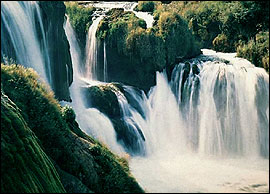 |
The basin united - Bosnia and Herzegovina joins the ICPDRThe last remaining country in the basin has signed the Danube River Protection Convention, bringing the nations of the Danube together in protection of the most international basin in the world. |
 |
Bosnia and Herzegovina depends
on rivers like the Una for water supply, agriculture, electricity,
fishing and tourism. Joining the ICPDR will help preserve the quality
of these waters and protect them from pollution. |
The Danube Basin is complete at last, as
the only remaining country formally to ratify the Danube River Protection
Convention, Bosnia and Herzegovina, signed in December. Bosnia and Herzegovina's
ratification gives the entire basin reason to celebrate, as it closes a
gap in the convention and brings all the waters of the basin, from the Black
Forest to the Black Sea, together for the first time.
Bosnia and Herzegovina has one of the densest water flow networks in Europe,
and most of its territory lies in the Danube Basin, including the basins
of Bosnia's largest rivers: the Una, Vrbas, Bosna, Drina and Sava.
By ratifiying the convention, Bosnia and Herzegovina has committed itself
to cooperate with the other twelve countries on essential concerns of water
resources, and to undertake appropriate legal, administrative and technical
measures to improve the environment and water quality in the basin.
"Most of this part of the basin is made from water flows than can certainly be qualified as the best part of Bosnia and Herzegovina's water potential," said Ibro Èengiæ , head of Bosnia's delegation to the ICPDR. "What needs to be done to properly begin implementing the Danube Protection Convention is to enact a person and an institution at the national level, to represent Bosnia and Herzegovina in all the international relations concerning the convention. We have already delegated our representatives to all ten expert groups of the Permanent Secretariat, but it would be more important to adopt the law on water protection at the state level, because the two Entity laws on that are not harmonised," said Èengiæ.
Overcoming pollution.
Before the war, 13 wastewater treatment and purification plants existed
in Bosnia and Herzegovina. Now, only three are functional. The plant in
Sarajevo was devastated during the war and is not operational today. "Sarajevo,
as the largest city and therefore the largest polluter, does not have a
plant for water treatment and purification. Since the plant stopped operating,
all the collected wastewater from the area covered by the sewerage system
is let out into the River Miljacka, and then into the Bosna, the Danube
and so on," explains Federation of BiH's Chief Water Inspector, Nada
Galiæ.
"The wastewater and pollution originating from Sarajevo influence the pollution of water not only in Bosnia and Herzegovina, but much farther, all the way to the Black Sea. One could actually say that we are global polluters," she says. Still, Galiæ believes the quality of nonstagnant waters has significantly improved compared with their pre-war state, primarily due to the drastic reduction of industrial production and wastewater output from industrial facilities.
 |
Ibro Èengiæ, ICPDR head of delegation
from
Bosnia and Herzegovina, with the national winners of the Danube Art
Masters competition, believes that the best of Bosnia and Herzegovina's
water potential lies in the Danube Basin. |
The greatest challenge - a singular state policy.
Although water may be the most valuable natural resource of Bosnia and Herzegovina,
no single responsible ministry exists at the state level. Water resource
management is the domain of entity ministries, Federation of BiH and Republika
Srpska, and the activities of those ministries often overlap, with evident
lack of responsibility and adequate policy in water management at the state
level.
"We lack consistent management from one point that would define rational
water usage and its protection," says Èengiæ . "However, the most
important is the adoption of respective laws, in order to legally regulate
the environmental criteria and our rights and obligations in implementing
European directives on waters, that are integral parts of the whole process
of harmonisation with European laws, but also a part of the process of our
accession to the European Union," says Èengiæ.
Success through cooperation.
The adoption of European standards will be tough without the establishment
of a ministry for environmental protection or sustainability of natural
resources at the state level. The ICPDR, however, is ready to help. The
ICPDR and the UNDP/GEF Danube Regional Project coordinated a workshop in
December to aid Bosnia and Herzegovina in implementing the EU Water Framework
Directive. Bosnia and Herzegovina has significant interest in strengthening
international cooperation, to preserve the still high-quality water resources
and ecosystems in the Danube River Basin through significant financial assets,
as well as proper human resources.
The ICPDR is committed to assisting its newest member to implement the laws
and policies required under the EU Water Framework Directive, and to strengthen
its capacity for water management. Through involvement in the ICPDR, Bosnia
and Herzegovina will be able to meet the goals of preserving the general
quality of life in the basin, preventing environmental incidents and damage,
and viably managing natural resources.
Signing the Danube River Protection Convention opens new possibilities for
protecting water in Bosnia and Herzegovina, but also forces a change of
the approach to international obligations, sustainable management and sustainable
exploitation of natural resources that are currently being exploited in
an unplanned and unrestricted manner in Bosnia and Herzegovina.